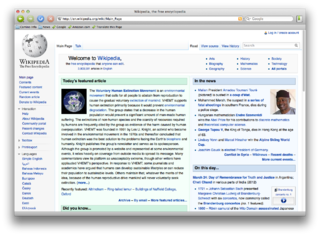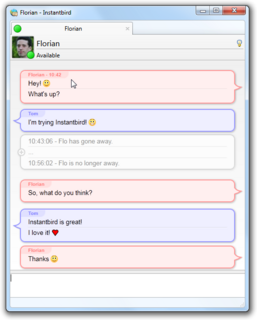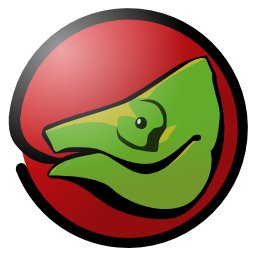 W
WGecko is a browser engine developed by Mozilla. It is used in the Firefox browser, the Thunderbird email client, and many other projects.
 W
WCamino is a discontinued free, open source, GUI-based Web browser based on Mozilla's Gecko layout engine and specifically designed for the OS X operating system. In place of an XUL-based user interface used by most Mozilla-based applications, Camino used Mac-native Cocoa APIs. On May 30, 2013, the Camino Project announced that the browser is no longer being developed.
 W
WClassilla is a Gecko-based Internet suite for PowerPC-based classic Macintosh operating systems, essentially an updated descendant of the defunct Mozilla Application Suite by way of the Mac OS port maintained in the aborted WaMCom project. The name is a portmanteau of Classic, and Mozilla.
 W
WMozilla Firefox, or simply Firefox, is a free and open-source web browser developed by the Mozilla Foundation and its subsidiary, the Mozilla Corporation. Firefox uses the Gecko layout engine to render web pages, which implements current and anticipated web standards. In 2017, Firefox began incorporating new technology under the code name Quantum to promote parallelism and a more intuitive user interface. Firefox is officially available for Windows 7 or newer, macOS, and Linux. Its unofficial ports are available for various Unix and Unix-like operating systems including FreeBSD, OpenBSD, NetBSD, illumos, and Solaris Unix. Firefox is also available for Android and iOS. However, the iOS version uses the WebKit layout engine instead of Gecko due to platform requirements, as with all other iOS web browsers. An optimized version of Firefox is also available on the Amazon Fire TV, as one of the two main browsers available with Amazon's Silk Browser.
 W
WFirefox for Android is a free and open-source web browser developed by Mozilla for Android smartphones and tablet computers. Firefox for Android uses the GeckoView engine.
 W
WFirefox OS is a discontinued open-source operating system – made for smartphones, tablet computers and smart TVs – designed by Mozilla and external contributors. It is based on the rendering engine of the Firefox web browser, Gecko, and on the Linux kernel. It was first commercially released in 2013.
 W
WFlock is a discontinued web browser that specialized in providing social networking and Web 2.0 facilities built into its user interface. Earlier versions of Flock used the Gecko HTML rendering engine by Mozilla. Version 2.6.2, released on January 27, 2011, was the last version based on Mozilla Firefox. Starting with version 3, Flock was based on Chromium and so used the WebKit rendering engine. Flock was available as a free download, and supported Microsoft Windows, Mac OS X and, at one time, Linux as well.
 W
WGaleon is a discontinued Gecko-based web browser that was created by Marco Pesenti Gritti with the goal of delivering a consistent browsing experience to GNOME desktop environment. It gained some popularity in the early 2000s due to its speed, flexibility in configuration and features.
 W
WGNU IceCat, formerly known as GNU IceWeasel, is a free software rebranding of the Mozilla Firefox web browser distributed by the GNU Project. It is compatible with Linux, Windows, Android and macOS.
 W
WGoanna is an open-source browser engine that is a fork of Mozilla's Gecko. It is used in the Pale Moon browser, the Basilisk browser, and other UXP-based applications. Other uses include a fork of the K-Meleon browser and a fork of Pale Moon called Mypal.
 W
WInstantbird is a cross-platform instant messaging client based on Mozilla's XULRunner and the open-source library libpurple used in Pidgin. Instantbird is free software available under the GNU General Public License. Over 250 add-ons allow user customization of, and addition of, features. On October 18, 2017 Florian Quèze announced that "... we are stopping development of Instantbird as a standalone product."
 W
WK-Meleon is an open-source web browser for Microsoft Windows. Originally based on the same Gecko layout engine as Mozilla Firefox and SeaMonkey, K-Meleon's design goal is to provide a fast and reliable web browser while providing a highly customizable interface and using system resources efficiently. Beginning with K-Meleon 76.2G, builds of the browser have utilized the Goanna layout engine instead of the Gecko engine. The browser is released under the GNU General Public License.
 W
WKaiOS is a mobile operating system based on Linux, developed by KaiOS Technologies Limited, a company based in Kowloon, Hong Kong, for keypad devices with largest shareholder being Chinese multinational electronics conglomerate TCL Corporation. It is forked from B2G OS, an open source community-driven fork of Firefox OS, which was discontinued by Mozilla in 2016.
 W
WKazehakase was a web browser for Unix-like operating systems that uses the GTK+ libraries. Kazehakase embeds the Gecko layout engine as well as GTK+ WebKit.
 W
WKomodo Edit is a free and open source text editor for dynamic programming languages. It was introduced in January 2007 to complement ActiveState's commercial Komodo IDE. As of version 4.3, Komodo Edit is built atop the Open Komodo project.
 W
WKomodo IDE is an integrated development environment (IDE) for dynamic programming languages. It was introduced in May 2000. Many of Komodo's features are derived from an embedded Python interpreter.
 W
WKompoZer is a discontinued open source WYSIWYG HTML editor based on the Nvu editor, which was itself derived from the Composer component of the Mozilla Application Suite. KompoZer was forked as a community-driven project with development coordinated through Sourceforge.
 W
WMozilla Sunbird is a discontinued free and open-source, cross-platform calendar application that was developed by the Mozilla Foundation, Sun Microsystems and many volunteers. Mozilla Sunbird was described as "... a cross platform standalone calendar application based on Mozilla's XUL user interface language." Announced in July 2003, Sunbird was a standalone version of the Mozilla Calendar Project.
 W
WNightingale is a discontinued free, open source audio player and web browser based on the Songbird media player source code. As such, Nightingale's engine is based on the Mozilla XULRunner with libraries such as the GStreamer media framework and libtag providing media tagging and playback support, amongst others. Since official support for Linux was dropped by Songbird in April 2010, Linux-using members of the Songbird community diverged and created the project. By contrast to Songbird, which is primarily licensed under the GPLv2 but includes artwork that is not freely distributable, Nightingale is free software, licensed under the GPLv2, with portions under the MPL and BSD licenses.
 W
WSeaMonkey is a free and open-source Internet suite. It is the continuation of the former Mozilla Application Suite, based on the same source code, which itself grew out of Netscape Communicator and formed the base of Netscape 6 and Netscape 7.
 W
WSongbird is a discontinued music player originally released in early 2006 with the stated mission "to incubate Songbird, the first Web player, to catalyze and champion a diverse, open Media Web".
 W
WSpicebird was a personal information manager based on Mozilla Thunderbird's code developed by an Indian company called Synovel. It was free and open-source software.
 W
WTenFourFox is a web browser for Power Macintosh computers, based on Mozilla's Gecko layout engine. It is a port of Mozilla Firefox for PowerPC-based Macintosh computers running Mac OS X to retain compatibility with the older architecture and older versions of the operating system, and to add PowerPC-specific optimizations for improved performance. The project was started after Mozilla announced that it would not release Firefox 4 for PowerPC versions of OS X. Like Firefox, it includes compatibility with a wide range of addons, Acid2 and Acid3 compliance, and HTML 5 and CSS 3 features. It also includes JavaScript just-in-time compilation, custom builds for specific PowerPC processor families, and AltiVec acceleration of key media codecs. The primary maintainer is Cameron Kaiser.
 W
WWaterfox is an open-source web browser for x64, ARM64, and PPC64LE systems. It is intended to be ethical and maintain support for legacy extensions dropped by Firefox, from which it is forked. There are official releases for Windows, Mac OS, Linux and Android in two versions: Classic and Current.